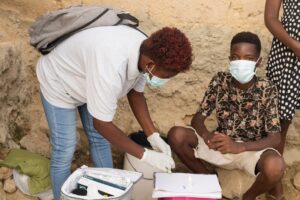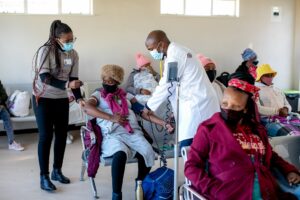Working to Make Universal Health Coverage a Reality
The cornerstone of universal health coverage (UHC) is access to affordable, quality primary healthcare, but many people around the world still struggle to access basic health services.
According to the United Nations Development Programme (UNDP), several challenges have contributed towards this growing crisis. The widening economic and social inequalities, rapid urbanisation, and the continuing burden of HIV and other infectious and Non-Communicable Diseases are making it increasingly difficult for communities to bridge the gap between supply and demand for healthcare.
Working to Make Universal Health Coverage a Reality
Achieving UHC requires delivering quality primary health care, and it is for this reason that mothers2mothers (m2m) is increasingly integrating clinical services into our model to respond to the urgent needs of the communities we serve.

Mentor Mother Catarina from a community in Benguela Province preparing to perform an HIV test on a biological child of one of her clients.
Working towards this goal, in Angola, m2m has upskilled Mentor Mothers to provide community index case tracing and testing services in 18 health facilities and surrounding communities in Lunda Sul, Benguela, Cunene, and Huambo provinces. The objective of this programme is to ensure that index clients’ families (sexual partners and biological children) know their status and are immediately put on treatment.
“We time our follow-up visits for after school and after work to ensure we provide HIV testing to her biological children and partner. If they are tested HIV-positive, we give them a referral to get started on treatment as soon as possible,” says Zaida Barros—a Mentor Mother based in Benguela Province.
Our work in Angola and in Lesotho—where m2m now employs nurses to work alongside Mentor Mothers to provide women and children with maternal and child health and HIV testing services—is being supported through the U.S. President’s Emergency Plan for AIDS Relief (PEPFAR), through the United States Agency for International Development (USAID) under the RISE II mechanism.
According to Maternal and Child Health Nurse—Sebabatso Molete, who works at Tsakolo Health Centre in Mafeteng District, Lesotho—some of the biggest health challenges facing her community are the high levels of morbidity and mortality rates amongst mother and baby pairs, due to pregnancy-related complications.
“Most of our clients stay in rural areas, and they must travel long distances over mountains and rivers to get to the nearest clinic. In the rainy seasons, roads are wet, and the low-lying bridges are often washed away, making it impossible to travel. We regularly must cross rivers on foot with Mentor Mothers when visiting villages for health check-ups,” says Sebabatso.
“We have a responsibility to provide our clients with the best, comprehensive quality healthcare. During our community visits we do home-based HIV and pregnancy screenings, infant HIV testing, initiate clients on antiretroviral treatment and do medication refills, educate clients on family planning and general best health practices.”
Children born to women living with HIV are also greatly impacted by inadequate health coverage. Usually, the diagnostic tests are performed at laboratories and the process has many challenging steps. Collecting wet blood samples can only be done by trained professionals and it requires special storage and transportation procedures to keep the samples stable. This causes significant delays in getting results to clinicians and caregivers.
According to the World Health Organization (WHO) for universal health coverage to be truly universal, a shift is needed from health systems designed around diseases and institutions towards health systems designed for people, with people.

m2m MCH Nurse—Katleho Sefali and Mento Mother—Kelebone working together to monitor nutrition and high blood pressure on a pregnant client at Tsepo Health Centre.
In line with creating health systems to serve needs of communities, Mentor Mothers in Zambia conduct dry blood spot testing (DBS)—a very efficient method in settings where healthcare workers are overwhelmed by the volume of people who need testing services. Dry blood spot testing is a sampling technique where small blood samples, obtained from pricking the finger (or heel in case of infants), are blotted on an absorbent paper and allowed to dry for analysis to screen for HIV.
“As a consortium partner under the USAID PEPFAR Supporting an AIDS-Free Era (SAFE) programme implemented by John Snow, Inc., we saw an opportunity to step up and support overwhelmed nurses who didn’t have time to conduct this testing which is now a national guideline,” says m2m Zambia Country Director, Priscilla Banda.
“Mentor Mothers have moved beyond the role of health educators; they are community health workers. Enabling them to conduct HIV tests of women and infants at key service delivery points eases the burden of overstretched health systems. In addition to being taught how to perform DBS testing, the Mentor Mothers received specialised counselling theory and practice training as well.”
Investments in quality primary health care is the cornerstone for achieving universal health coverage around the world. m2m will continue to grow and innovate our programme until that becomes a reality.






















